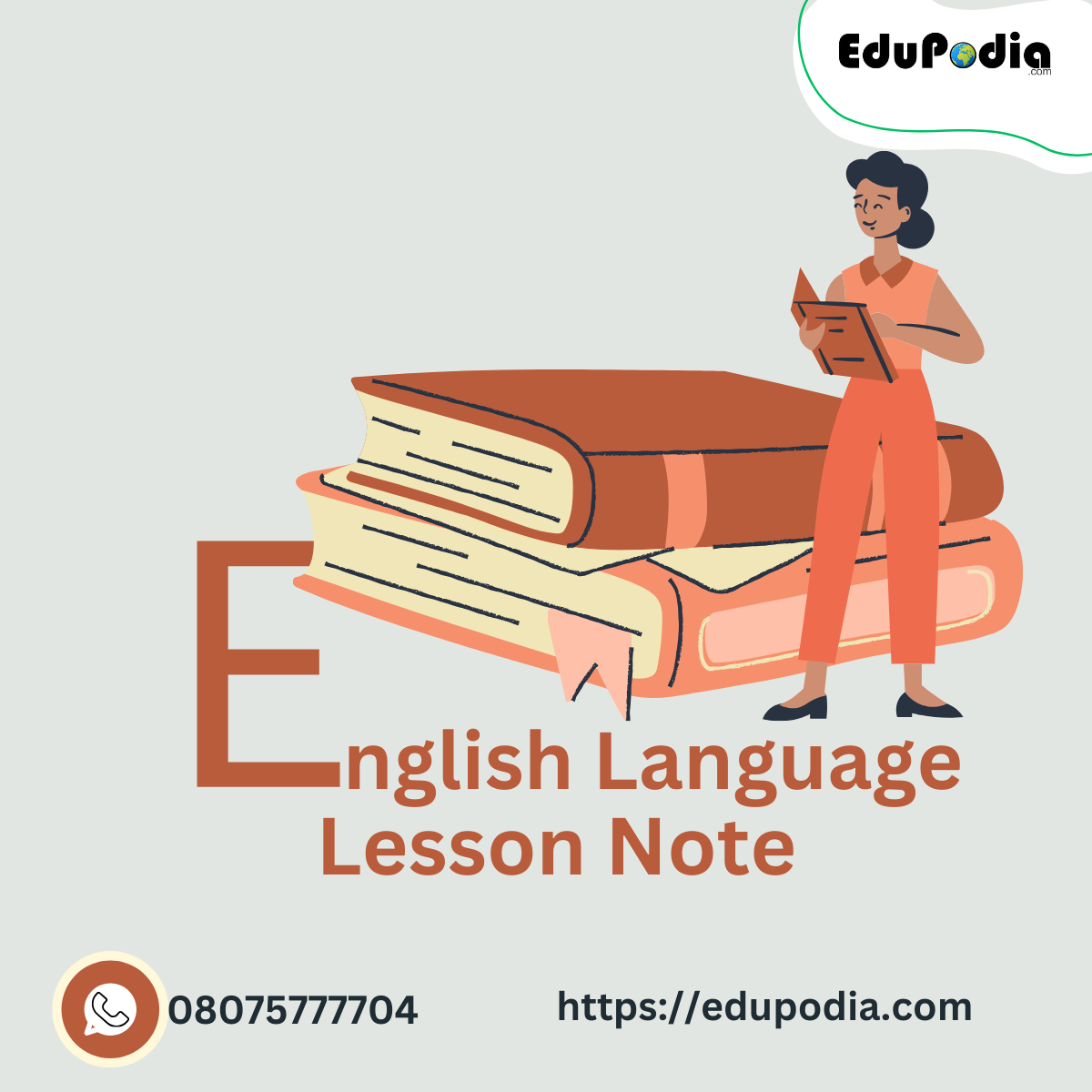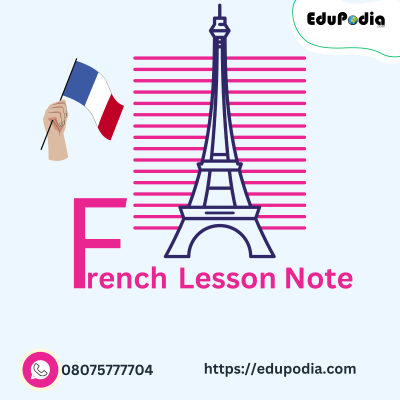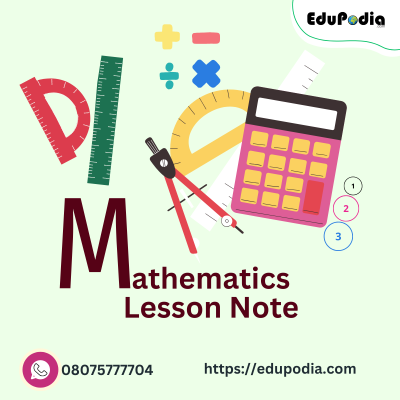Description
These lesson notes cover the following topics for JSS1 First, Second and Third Term English Language:
First Term
- Speech work: Introduction to speech (organs of speech)
Grammar: Parts of speech – Nouns
* Meaning, Identification of Nouns in Sentence
* Types of Nouns with Examples
Comprehension: The Family~ Unit 1
Composition: Meaning, Types of Composition (Narrative, Descriptive, Argumentative, Expository)
Literature: What is Literature? The Features of Literature.
Types of Literature: Oral, Historical, Dance, Miming, Drama…see related text.
- Speech work: Pure Vowel sounds (Monothongs) with examples
Comprehension: Unit 2, page 31
Vocabulary development: Your School Subjects
Grammar/Structure: Pronouns: Meaning, Identification, Types.
- Comprehension: A Conversation, Page 43
Grammar/Structure: Verbs: Definition, Identification with examples.
Types of verbs: Transitive, Intransitive, Auxiliary and Lexical, Regular and Irregular (should be given as assignment)
Composition: Outlining the difference between descriptive and narrative essays
Literature: Introduction to prose and its elements, (plot, style, characterization)
Types of Oral Literature
- Comprehension: Unit 6, page 79. Two good Friends
Grammar: Adjectives: Definition, Identification,
Types of Adjectives
Composition: Narrative Essay– “My First day in Secondary School”
Speech Work: Vowels /I/
Literature: What is Oral Literature, Features of Oral Literature and Types.
- Comprehension : Unit 7(a) page 91 Oduduwa
Grammar: Comparision of Adjectives,
Absolute Adjectives: Excellent, Superior, Total
Speech work: Vowel /e /
Composition: Paragraph Writing:
Arrangement of Ideas in Logical sequence with Introduction and Conclusion.
Literature: Introduction to Drama, Elements and Types
- Speech work /ae /
Grammar: Adverbs : Identification, definition,
Types and examples.
Composition – Descriptive Essay: A Market Place
Comprehension: Unit 7
Literature – Use Recommended Text. (Prose)
- Speech Work: / a:/
Comprehension: Unit 8, page 103. Every Man and Death
Composition: Introduction to Letter Writing and Types
. Literature – Introduction to for folktale
- Comprehension: Unit 9
Composition: Features of an Informal Letter with sample model
Literature: Introduction to Figures of Speech ( Simile, Metaphor, Personification, Alliteration, Assonance)
- Speech Work: / /
Grammar: Introduction to Adverbs ( Features and Functions)
Comprehension: Unit 9b page 117
Composition: Informal Letter : Letter to your cousin, telling him about your new school
Literature: Review of recommended text/ Figures of speech
- Revision
- Test/ Examination
- Examination
Second Term
- Revision of Last Term’s Examination and Work
- Speech Work: Consonant/k/and/g/Structure Adverbs: Features, Position and Functions of Adverbs. Comprehension/ Vocabulary Dvpt.: Reading Skill (Reading for maximum Retention and Recall) Composition: Letter Writing: Formal/ Features of Formal Letters Literature: Review on the Genres of Literature (Prose, Poetry and Drama); Use recommended texts)
- Speech Work: Consonants/f/and/v/Structure: Conjunctions: Features, Position and Functions of Conjunctions. Comprehension/Vocabulary Dvpv: Writing Skill – answering questions on given passage. Composition: Letter writing Formal letters (Guided writing) Literature: Prose-Literary terms (use recommended text)
- Speech Work: Vowels/u/and/u:/: Structure: Prepositions: Features, Position and Functions of Prepositions. Comprehension/Vocabulary Dvpt: Reading and writing Skills (Intensive) Reading/Answering questions on given passage. Composition: Letter Writing – Guided writing (emphasis on Arrangement of ideas in logical sequence) Literature: Myths and Legends (African and Non-African tales comprising Myths and Legends)
- Speech Work: Vowel /æ/ and /ℨ:/: Comprehension/Vocabulary Dvpt.: Writing Skill Giving Specific Answers of a Given Passage Structure: Adverbials (making sentences with adverbial) Composition: Argumentative (Introduction)
- Speech Work Consonants/s/and/z/: Structure: More on Adverbials Comprehension/Vocabulary Dvpt.: Reading and Writing Skill contd Composition: Argumentative – Elements of composition Literature: Drama – Drama text, theme, Features; related literary terms
- Speech Work: Vowels – Introduction to Diphthongs (example) Structure: More on Adverbials and Tenses (using each item in sentences) Comprehension/Vocabulary Dvpt.: Reading Skill-Reading to understand the Author’s mood Composition: Argumentative – Arrangement of ideas in logical sequence
- Speech Work: Vowels:/ei/:Structure: Making sentences with adverbs, conjunctions and preposition Comprehension/Vocabulary Dvpt.: Writing Skill Composition: Argumentative (Guided Composition/writing) Literature: Drama: Types, Literary terms, Written text (Costumes, play Director, etc)
- Speech Work: Vowels:/ai/Structure: More on Adverbs, Conjunctions and Prepositions Comprehension/Vocabulary Dvpt.: Reading Skill Composition: Argumentative (Guided writing) Literature: More on Figures of Speech.
- Speech Work: Consonant / Ɵ/ and / ð /Structure: Verbs – Poems of Verbs Comprehension/Vocabulary Dvpt.: Reading and Writing Skills Composition: Speech Writing – Introduction Literature: Prose (use recommended Text)
- Revision
- Tests
- Examinations
Third Term
- REVISION
Speech Work: Diphthong
Grammar: Verb—Introduction
Comprehension: Unit 15, pages 194-195
Vocabulary Development: Air Transport
Composition: Descriptive Essay
Literature: Use of Recommended Text
- Speech Work: /Iᶕ/ and /aI/
Grammar: Tenses of Active and Passive Voice
Comprehension: Page 16
Composition: Elements of Descriptive Essay
Literature: Use of Recommended on Prose: Setting and Plot
- Speech Work: Introduction to Consonant sounds (twelve)
Grammar: The Use of Active and PassiveVoice with examples
Comprehension: Unit 3, Page 54
Composition: Argumentative Essay: Male Child is More Useful than a Female Child
Literature Poetry (Identification in a Poem).
- Speech Work:Two,Three&Four Syllables
Grammar: The Use of Active and Passive Voice with example
Comprehension: Unit 4, Page 54
Composition:Argumentative Essay: AMale Child is More Useful than a Female Child
Literature:Myths and Legend with moral Moral lessons from a legend.
Vocabulary Development:Words Associated with the Sick Bay
- Speech Work: Syllables Continued
Grammar: Exercises on Active andPasive Voice
Comprehension: Refer to Week 7 of 2nd Term
Composition: Formal Letter
Literature: Analysis of a Poem
Vocabulary Development: WordsAssociated with Cooking Page 156
- Grammar: Statements/ Tag Questionsand Responses
Speech Work: Consonant Clusters
Comprehension: Page 106; Unit 9
Composition: Narrative: An Accident I Witnessed
Vocabulary Development: Words Associated with Teaching
Literature: Drama Text
- Speech Work: Contsonanants (contd)
Grammar: Differences between Polar and Tag Questions
Comprehension: Revisit Week 8 0f 2nd Term
Vocabulary Development: Spelling Drills
Composition: Expository Essay
Literature: Recommended Text on Prose And Poetry
- Speech Work: /ᶕu/, /ai/ and /ei/
Grammar: Exercises on Verbs
Comprehension: Revisit Week 9 of 2ndTerm
Composition: (Oral) School Rules
Vocabulary Development: Spelling Drills
Literature:Changing Similes to Metaphors
- Grammar: Revision of Nouns, Pronoun, Verbs and Adjectives
Speech: Diphthongs (contd) exercise
Comprehension: Activity on Passage
Composition: Review all types of Essays
Literature: Figures of Speech
10 REVISION
11-12 EXAMINATION
To download the Complete First to Third Term JSS1 English Language Lesson Note, scroll up and use the order button to get started.



Edupodia –
Thanks for the review/feedback Basirat, we are glad you found our lesson notes useful and helpful.
Basirat –
Nice job edupodia???